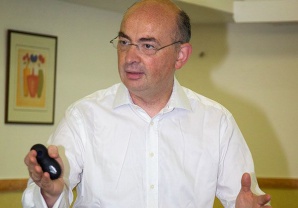
Making Oral Opioids Available in Eastern Europe and Central Asia
23/05/2013
Tanya Burdett: The public should be involved in decision-making
15/01/2014
Soros Foundation-Kazakhstan program coordinator Ainur Shakenova had a chance to meet with Mr. Watson and to ask him several questions about palliative care development in our country.
AS: Maxwell, why did you choose this field in medical practice – it’s not that profitable (as I know), and you dealing with dying patients every day…
MW: I worked as a Mission Doctor in Rural Nepal for eight years. Every day in the clinic I saw patients with incurable diseases who were spending money that they didn’t have, wasting time that was short, seeking a nonexistent cure for their condition. That is when I saw the real need and value of palliative care allowing people to live their lives well to the very end.
AS: What do you think about palliative care (PC) development in our country?
MW: Like many countries facing many difficult health challenges palliative care has only become a government priority in Kazakhstan recently with their exciting National Strategy. Palliative care is concerned with ensuring that patients approaching the end of life are able to be kept as comfortable and with as much dignity in their place of choice which, for most of us, would be at home. I understand that there is a very long and strong tradition in your country that families look after patients at home when they are approaching the end of life. This means that patients are able to have the emotional and spiritual support that they need at this time. The major difficulty that must be overcome is to ensure that patients can have access to the necessary medicines at home so they can be comfortable no matter where they are across your huge homeland. It will be a real challenge to achieve this but it’s possible.
AS: Many people think – shouldn’t doctors be more concerned about patients with curable diseases, then wasting their time on the incurables…
MW: Mahatma Ghandi said, A nation’s greatness is measured by how it treats its weakest members, the very young, the sick and the dying. I think he is right. The one sure thing is that we all will one day die, so even from a very selfish motivation it is important to ensure that the services and medications are in place so that when our time comes we will have the chance to be able to die well, with comfort and dignity.
AS: Kazakhstan is among countries with the lowest consumption of opioid analgesics. Is it really such a big problem as most human rights defenders think? What should be done to improve pain treatment in our country?
MW: While family support for dying patients is a big strength in your country, the lack of availability of the cheap pain killers which have transformed suffering in other places is very worrying. Availability of morphine, for example across the country is limited to injectable or expensive patch systems. The paperwork involved in prescribing such medications puts many Doctors off from using them so patients are left to deal with their pain using drugs which we know from other places are often ineffective. Kazakhstan urgently needs oral morphine to be made available so that patients will be able to have their pain controlled in their own homes.
People have many fears about morphine and that it might make patients into drug addicts. For patients in the last periods of their lives this is simply not true. I have seen patients curled up in a ball unable to speak or eat because they were in so much pain being transformed after only a few minutes by a morphine tablet costing less than 10 Tenge.
People need to know that you do not have to die in pain. Having seen many people die I have witnessed the devastating impact that uncontrolled pain has not just for the patient but for the family and even the whole village who hear the distress of their neighbor.
AS: What else needs to be done to bring PC in Kazakhstan in accordance with the best international standards and practices?
MW: There are three things which are necessary according to the WHO.
- Education of the public and of the health care professionals about what Palliative Care is and how it has its roots in the ancient culture of your peoples who for centuries have taken great pride in caring for the dying.
- A national strategy which commits the Government and the health ministry to overcome the problems that permit 16,000 people a year to die without access to basic palliative care, and the resultant reduction in suffering
- Availability of the WHO essential palliative care drugs through a system which is safe and which is able to deliver constant supplies of such drugs right across the country.

